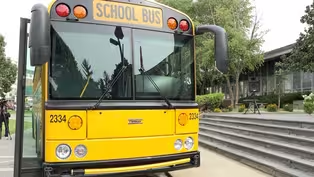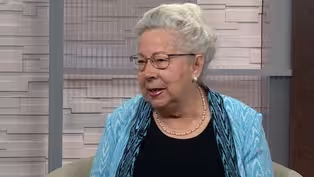
Housing Shortage Expected to Get Worse
Clip: Season 4 Episode 52 | 3m 42sVideo has Closed Captions
A panel discussed what's behind Kentucky’s housing shortage and why home prices are so high.
Kentucky is short 206,000 housing units, according to the Kentucky Housing Corporation. And that shortage will swell to 287,000 by the year 2029. On “Kentucky Tonight,” a panel discussed what's behind Kentucky’s housing shortage and why home prices are so high.
Problems playing video? | Closed Captioning Feedback
Problems playing video? | Closed Captioning Feedback
Kentucky Edition is a local public television program presented by KET

Housing Shortage Expected to Get Worse
Clip: Season 4 Episode 52 | 3m 42sVideo has Closed Captions
Kentucky is short 206,000 housing units, according to the Kentucky Housing Corporation. And that shortage will swell to 287,000 by the year 2029. On “Kentucky Tonight,” a panel discussed what's behind Kentucky’s housing shortage and why home prices are so high.
Problems playing video? | Closed Captioning Feedback
How to Watch Kentucky Edition
Kentucky Edition is available to stream on pbs.org and the free PBS App, available on iPhone, Apple TV, Android TV, Android smartphones, Amazon Fire TV, Amazon Fire Tablet, Roku, Samsung Smart TV, and Vizio.
Providing Support for PBS.org
Learn Moreabout PBS online sponsorshipKentucky needs homes.
The state is short 206,000 housing units, according to the Kentucky Housing Corporation, and that shortage will swell to 287,000 by the year 2029.
We talked about Kentucky's housing crisis on last night's Kentucky Tonight, and I asked our panel, what's causing the housing shortage and why are home prices so high?
Costs are up.
Inventory is down.
Right.
The Kentucky median home cost is up 49% in the past five years.
April 20th 2152 K now April 2025, the average home price or went up to 226 K, so and the inventory is down by 20 something percent since 2018.
What do you make of all of these numbers and how how severe is the housing shortage in Kentucky?
And is it any different than what's happening nationwide.
So it's very severe.
And I would say it's a crisis, a crisis because the number has gotten so large and there's nothing happening currently that would make us think the trajectory is going to change.
The biggest reason that we need more than 200,000 more housing units right now, all across the state, homeownership and rental for all incomes is goes all the way back to the 2008 housing crisis and the recession that followed.
We lost so many home builders because of the mortgage crisis and all of the foreclosures.
And those home builders, retired, got into some other line of work.
And when you lose a home builder, you're losing all of the contractors that work for them.
And so we lost a whole industry, and there weren't generations kind of learning that work and coming up behind them, taking over family businesses.
And so now we have some counties that really feel like they have to beg and plead to get a home builder or an apartment builder to come.
And we have home builders that can kind of have their pick of what kind of, home to build.
And the margins have gotten really tight for them.
There are a lot of factors, but the biggest one goes back to we are still not building, on average, what we used to build in 2006, 2007.
Yeah.
And that stems from the 2008 recession.
So I want to come to you and get this end for because you represent the home builders.
And, you know, many consumers may say, I really don't feel sorry for developers, right, that they feel like maybe they're some of them who are starting to enter the market may feel like they're priced out of the market.
So help consumers understand like the margins with developers work into and the considerations they make before they get into that kind of project.
You know, I say all the time when I speak to people about homebuilding, they drive down the street and they see a development going up.
What they don't understand is that that development was years in the making, acquiring the land, studies having to be done, and all of those go into the cost of the home.
And there are so many other factors too.
With our builders.
I mean, there's overregulation, and I hope we get to have a part of that conversation.
There's, an increase, of course, in the interest rates.
We know that's been a challenge.
Unfortunate.
That's something that's out of our control, right now.
And then the building materials, supply issue.
And, I mean, since Covid, we've seen the numbers just continue to increase.
And what we have to keep in mind, again, is that all of that goes into the cost of the home that is ultimately passed down to that home buyer, and that renter.
And we're starting to see that really slip away.
We also talked about solutions to the problem in the housing crisis.
And we hear from realtors, home builders and housing advocates, which you can watch online on demand Kentucky tonight at KETV.
Org slash k y tonight.
Advocates Say More Money Needed to Fund Public Education
Video has Closed Captions
Clip: S4 Ep52 | 3m 38s | Advocates say public education needs $700 million more than allocated in the last budget. (3m 38s)
Video has Closed Captions
Clip: S4 Ep52 | 3m 46s | Some students were invited to Kentucky State University's campus for their annual Ag Roundup event. (3m 46s)
Learning About New American Cursive
Video has Closed Captions
Clip: S4 Ep52 | 2m 49s | A discussion with the creator of a new cursive handwriting style being taught in Kentucky schools. (2m 49s)
Making Bourbon Tours More Accessible
Video has Closed Captions
Clip: S4 Ep52 | 4m 16s | A distillery is helping people with vision and hearing impairments experience the bourbon industry. (4m 16s)
Providing Support for PBS.org
Learn Moreabout PBS online sponsorship
- News and Public Affairs

Top journalists deliver compelling original analysis of the hour's headlines.

- News and Public Affairs

FRONTLINE is investigative journalism that questions, explains and changes our world.












Support for PBS provided by:
Kentucky Edition is a local public television program presented by KET



